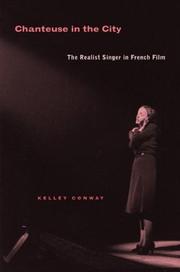| Listing 1 - 2 of 2 |
Sort by
|
Book
ISBN: 1787444694 1783273755 9781783273751 9781787444690 Year: 2019 Publisher: Woodbridge, Suffolk The Boydell Press
Abstract | Keywords | Export | Availability | Bookmark
 Loading...
Loading...Choose an application
- Reference Manager
- EndNote
- RefWorks (Direct export to RefWorks)
How did Anglo-Saxons reflect on the experience of growing old? Was it really a golden age for the elderly, as has been suggested? This first full survey of the Anglo-Saxon cultural conceptualisation of old age, as manifested and reflected in the texts and artwork of the inhabitants of early medieval England, presents a more nuanced and complicated picture. The author argues that although senescence was associated with the potential for wisdom and pious living, the Anglo-Saxons also anticipated various social, psychological and physical repercussions of growing old. Their attitude towards elderly men and women - whether they were saints, warriors or kings - was equally ambivalent. Multidisciplinary in approach, this book makes use of a wide variety of sources, ranging from the visual arts to hagiography, homiletic literature and heroic poetry. Individual chapters deal with early medieval definitions of the life cycle; the merits and downsides of old age as represented in Anglo-Saxon homilies and wisdom poetry; the hagiographic topos of elderly saints; the portrayal of grey-haired warriors in heroic literature; Beowulf as a mirror for elderly kings; and the cultural roles attributed to old women.
Old age --- Aging --- History. --- Social aspects. --- Later life (Human life cycle) --- Senescence --- Adulthood --- Age --- Longevity --- Older people --- Great Britain --- History --- Anglo-Saxon Culture. --- Anglo-Saxons. --- Cultural Roles. --- Early Medieval England. --- Elderly Saints. --- Heroic Literature. --- Leiden University. --- Medieval English. --- Old Age. --- Pious Living. --- Senescence. --- Wisdom. --- cultural conceptualization. --- early medieval England. --- historical attitude. --- multidisciplinary approach. --- old age. --- Old age in literature. --- English literature --- Literature, Medieval --- Social aspects --- History and criticism.

ISBN: 9786612763182 0520938577 1282763180 159734527X 9780520938571 0520240197 9780520240193 0520244079 9780520244078 Year: 2004 Publisher: Berkeley University of California Press
Abstract | Keywords | Export | Availability | Bookmark
 Loading...
Loading...Choose an application
- Reference Manager
- EndNote
- RefWorks (Direct export to RefWorks)
Long before Edith Piaf sang "La vie en rose," her predecessors took to the stage of the belle epoque music hall, singing of female desire, the treachery of men, the harshness of working-class life, and the rough neighborhoods of Paris. Icon of working-class femininity and the underworld, the realist singer signaled the emergence of new cultural roles for women as well as shifts in the nature of popular entertainment. Chanteuse in the City provides a genealogy of realist performance through analysis of the music hall careers and film roles of Mistinguett, Josephine Baker, Fréhel, and Damia. Above all, Conway offers a fresh interpretation of 1930's French cinema, emphasizing its love affair with popular song and its close connections to the music hall and the café-concert. Conway uncovers an important tradition of female performance in the golden era of French film, usually viewed as a cinema preoccupied with masculinity. She shows how-in films such as Pépé le Moko, Le Crime de Monsieur Lange, and Zouzou-the realist chanteuse addresses female despair at the hopelessness of love. Conway also sheds light on the larger cultural implications of the shift from the intimate café-concert to the spectacular music hall, before the talkies displaced both kinds of live performance altogether.
Motion pictures --- Women singers --- Motion picture music --- Popular music --- Background music for motion pictures --- Film music --- Film scores --- Movie music --- Moving-picture music --- Dramatic music --- Music --- History. --- History and criticism. --- 82:791.43 --- 82:791.43 Literatuur en film --- Literatuur en film --- History and criticism --- History --- 1930s. --- beauty. --- belle epoque music hall. --- cafe concert. --- cinema lovers. --- cinemaphiles. --- cultural implications. --- cultural roles. --- cultural studies. --- female desire. --- femininity. --- film and culture. --- film historians. --- france. --- french cinema. --- french culture. --- french film. --- gender roles. --- golden era. --- music hall careers. --- music. --- paris. --- popular entertainment. --- popular music. --- realist performance. --- realist singer. --- singers. --- theatre. --- women in film. --- womens roles. --- working class life.
| Listing 1 - 2 of 2 |
Sort by
|

 Search
Search Feedback
Feedback About UniCat
About UniCat  Help
Help News
News